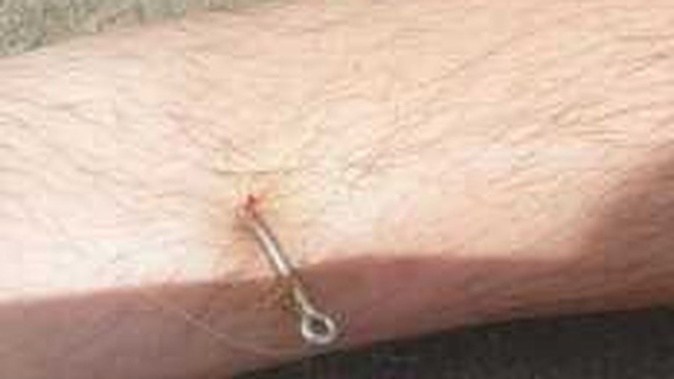
A woman whose son ended up in Tauranga Hospital after a fisherman’s longline hook became embedded in his leg during a day at a Mount Maunganui beach says there needs to be more safety awareness.
The call has been supported by the NZ Recreational Fishing Council which says electric longlines were “hellishly dangerous” and regulation should be encouraged.
Jan Higgins visited Tay St beach with her two adult children recently. . They were about 50m away from a fisherman who had a longline device in the water.
“We were just enjoying the beach like a whole lot of other people and weren’t in the water at this point. I saw some fish hooks on the ground as he was letting the line out and I saw some dogs walking by.”
Higgins said she told the fisherman it was probably not a good place to be.
Tay St beach is popular among swimmers, surfers and people walking their dogs.
/cloudfront-ap-southeast-2.images.arcpublishing.com/nzme/ZNZEL5KCVZAJFFTBU3C66Y3MYE.jpg) Jan Higgins wants to raise safety awareness around longline fishing for beachgoers and fishers. Photo / Alex Cairns
Jan Higgins wants to raise safety awareness around longline fishing for beachgoers and fishers. Photo / Alex Cairns
“He basically told me to ‘f*** off’ and ‘you’re f****** kidding me’.
She said he told her: “I’ve come here to fish. I’m allowed to be here. You’re ruining my day.”
Higgins said, in her view, the fisherman was aggressive and she felt threatened.
Soon after a dog picked up a hook off the sand and got it caught in his mouth, she said.
Higgins said the fisherman grabbed his pliers and ripped the hook out before the owners, who were further down the beach, arrived. She then watched a boogie boarder get tangled in his fishing line, she said.
About this time, Higgins’ sons were playing Frisbee in the water when one became snagged by a two-inch hook, she said.
“He was hooked through his leg by his shin. The current was taking the line sideways. Then the fisherman came running over stopped trawling and tried to rip the hook out of his leg and I’m like, ‘Woah, woah’.”
Lifeguards, who were on the beach, called an ambulance but it was diverted elsewhere so Higgins’ son was carried on a surfboard to her car and she drove him to Tauranga Hospital .
Doctors asked Higgins if she had contacted the police and told her to.
Higgins also posted the incident on social media to inform others.
In her view: “What if it was a child? It’s a disaster waiting to happen.”
However, the post drew vitriol with some comments just “disgusting”. These included “get out of Town Karen”, “carm your farm b****”.
Others were more supportive: “move your long line Pal”.
Higgins said she wanted to “raise awareness for beachgoers to stay clear and for anglers to stay mindful of their surroundings”.
Surf Life Saving NZ’s eastern region lifesaving manager Chaz Gibbons-Campbell
said the coastline was to be enjoyed by all.
“Ideally, don’t swim where people are fishing, and vice versa - don’t fish where people are swimming. If you are longline fishing, it’s helpful to make sure your line is clearly visible to others on the beach, which can be done by placing a flag indicating where the line enters the water and never leave your line unattended.”
Tauranga City Council environmental regulation manager Nigel McGlone said longline or Kontiki fishing devices could be used anywhere along the beach but not within 300m of any flagged lifeguard area.
A council bylaw stated that longline or Kontiki fishing devices could not be used on the beach between the hours of 10am and 5pm from December 15 to February 15.
McGlone urged people to think about the “what ifs” if lines with hooks got entangled with other beach users.
NZ Recreational Fishing Council executive director Margaret Wind said such fishing devices were “hellishly dangerous” and there should be longline fishing regulations for the health and safety of others using the beach.
Longlines could also entrap wildlife such as birds.
Tauranga Hospital emergency department clinical nurse manager John Wylie said it could not comment due to patient privacy but it did see some presentations for hook removals throughout summer though the numbers were not large.
“We would always advise that doctors and nurses remove hooks, as they have to be taken out carefully so as not to cause further damage. After the hook is out, we check for any potential damage and also that the patient is up to date with their tetanus immunisation.”
Water Safety New Zealand research showed about a quarter of all New Zealanders go fishing.
In 2020/21, there were 4682 fishing-related injuries costing $6 million.
A police spokeswoman said if anyone feared for their safety or otherwise required immediate police assistance, they should call 111. After the fact, information can be provided to police by calling 105.
Carmen Hall is a news director for the Bay of Plenty Times and Rotorua Daily Post, covering business and general news. She has been a Voyager Media Awards winner and a journalist for 25 years.
Take your Radio, Podcasts and Music with you









